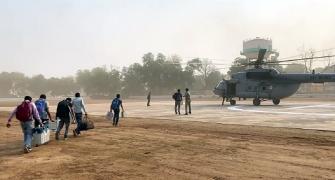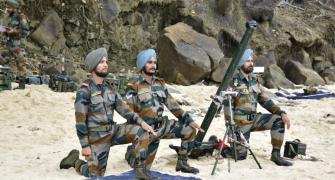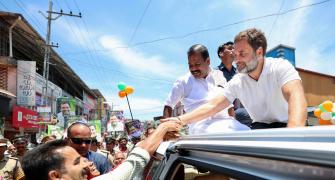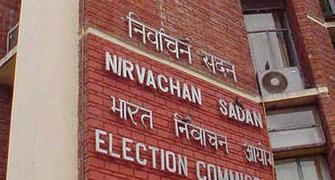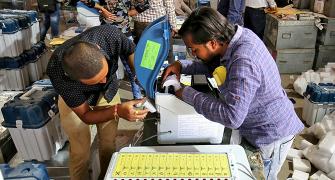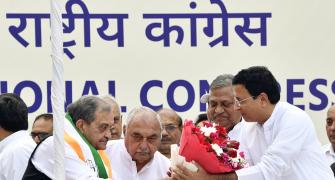The United States economy is on life support from Japan, China and the OPEC countries.
The dollar is about to be devalued by about 50 to 80 per cent.
America's $3 billion-a-day deficit, which is driving the world economy, cannot be sustained.
The world's economy is tottering on the verge of a major crisis.
The United Nations' Millennium Development Goals are a means for aid agencies to perpetuate, an attempt by governments to show that they were doing something, when actually they aren't.
The 21st century will be known as the Indian century. The Asian giant is in the "sweet spot" of development.
These were some of the opinions hurled about and contested at a discussion about India's Economic Policy: Strengths, Weaknesses and Prospects for the Future, as part of the Asia Society's ongoing 16th Asian Corporate Conference at the Grand Hyatt, Mumbai.
And everyone was bullish on India.
"I have invested in India, I'm making money and I'm happy," began Clyde Prestowitz, one of the two speakers of the discussion, who Richard C Holbrooke, the moderator, described as "one of the leading experts on international trade in the United States, and one of the most outspoken."
"He (Prestowitz) has written a number of books, each extremely provocative," noted Holbrooke, chairman, Asia Society.
"In Japan, he is particularly famous, but not always loved," Holbrooke added, referring to Trading Places, Prestowitz's book that looks at Japan-United States commercial ties.
Prestowitz, president of the think tank Economic Strategy Institute, said everybody knew India had problems, such as red tape and lack of infrastructure.
"You try to go from Electronic City to Leela Hotel (in Bangalore) and you realise India has infrastructure problems," he said.
Instead, he wanted to talk about some problems "not so usually talked about."
One of which was the model of development India would choose.
Prestowitz, a Ronald Raegan administration adviser-turned severe Bush critic and the author of the book Three Billion New Capitalists, said the Western world's and the US' model of heavy consumption which is identical to India's -- was not sustainable.
The role of the United States in the world economy is to buy, he said.
China had a problem in over investing, Prestowitz continued. For every dollar of GDP, China invests half, resulting in tremendous capital in manufacturing.
"If you set up a plant in China, the government gives you half the capital," he pointed out. But the main buyer for the manufactured products, US, could not go on buying, he said.
He cited the recent controversy over the handing of management of some US ports to Dubai firms as example that the political backlash to the just-buy model's tottering had begun. He said there was a legislation pending in the US Senate to put 27.5 per cent tariff on all Chinese imports.
"But, there would never be an India-US trade crisis," he added, concluding that all Asian currencies were under-valued and they would be rationalised against the dollar soon.
Surjit S Bhalla, principal and chief operating officer, Oxus investments, who was the other speaker at the discussion, said, "India is in the sweet spot of development."
The die is cast for 8 per cent growth without any further reforms, Bhalla said, pointing at the healthy Indian economic growth in the last three years, which was a great upswing from the last 50 years of below 5 per cent growth.
What India had witnessed in the last 15 years was completely unprecedented, he felt.
According to him, the rise of the Indian middle class with its purchasing power was a revolution that would drive the world economy.
"These people (the Indian middle class) have made money the old fashioned way," he said. They had invested in education and they were enforcing policy, he emphasised.
Though the infrastructure problem was a reality, no country had built infrastructure before it needed to, except Franklin Roosevelt after the Great Depression, Bhalla pointed out.
"China faced the infrastructure 10 years ago, we are facing it now," he said, confident that the problem would be solved.
When countered with questions about problems with social services like healthcare, Bhalla said India spends 5.1 per cent of its GDP on healthcare.
The problem was not with spending, the problem was with delivery of services, which was in the government's hand, he said.
When asked why India has not managed to attract $5 billion foreign direct investment when China attracts over $450 billion, he pointed out that the efficiency of capital usage is more in India than China.
That was contested by Hang Lung Group Chairman Ronnie Chan, one of China's most powerful businessmen, who said China's capital mostly went into manufacturing which had higher costs than services -- which India concentrated on -- which had less set up costs.
Bhalla acknowledged there were hurdles for India, but he was confident the Great Indian Middle Class would surmount all odds.
About the threat to the world economy from the US economy's apparently imminent collapse, Bhalla quipped, "As an investor, I have learnt to never bet against America."
Also see:
Asia Society Conference: Complete Coverage
'Merit in capital account convertibility'
India has come to terms with globalisation: PM

